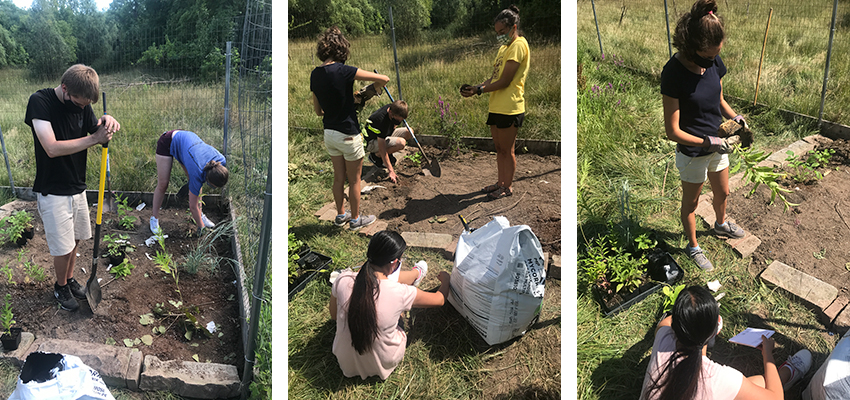
Student Conservation Efforts Earn "Program of the Year" Award
6 May 2021 Student Conservation Efforts Earn Program of the Year Award
A student project designed to protect and encourage pollinators won the 2021 Action Program of the Year award from the IMPACT Conference.
To provide food and habitats for bees, moths, butterflies and birds, three Hobart and William Smith students teamed up with the Office of Sustainability to create “pollinator patches” across campus. This spring, the IMPACT Conference recognized the work of James Anderson ’23, Maeve Reilly ’23 and Katerina Yacoub ’23 with the award for Action Program of the Year. The funding for their project was provided by the Carver & DeLaney Environmental Project Endowment award.

The IMPACT Conference is the largest annual conference focusing on college students’ civic engagement in community service, service-learning, community-based research, advocacy and other forms of social action. The Action Program of the Year award recognizes a campus-based program that models student-led direct action that strives to make their campus and communities a better place.
The project reflects “the type of students that come to HWS” — students who, using the campus as living laboratory, “are dedicated to make change in the world, and have the tenacity to see their projects through completion,” says Sustainability Manager Michael Amadori. “I am very proud the students were honored and recognized for their hard work! They volunteered their time and labor to create the pollinator patches that provide a service to our campus and a service to our pollinators.”
Stocked with plants that flower throughout the year, pollinator patches provide food and shelter for wildlife, mitigating the stress placed on local habitats by an overabundance of mown lawns and suburban sprawl. The patches complement the campus “grow zones,” where grass and wildflowers are allowed grow tall to encourage and sustain pollinators and other wildlife.

Anderson, Reilly and Yacoub began by researching native plants and the insects and animals that rely on them for sustenance, then developed plans for which plants would be best for the growing conditions of each site.
“Through this process they learned how to engage with different campus departments and different personalities as well as how to use feedback to find compromises and come up with solutions,” Amadori says. “To help support local businesses, the students purchased starter plants from a local company instead of ordering online. Lastly they recruited and motivated other students to get involved and help with the site preparing and planting.”
This project builds on the HWS community’s commitment to creating a sustainable and environmentally friendly landscape. In 2019 and 2020, Hobart and William Smith received the Bee Campus USA designation, which recognizes the incorporation of pollinator conservation and education into the Colleges’ land management practices, coursework, service learning, research and community engagement. Additionally, HWS was designated as a Tree Campus in 2020 for the ninth year in a row. Tree Campus USA is a national program that was launched in 2008 by the Arbor Day Foundation to honor colleges and universities for their leadership promoting healthy trees and engaging students and staff in the spirit of conservation. The campus also implements integrated pest management and best practices in turf and landscape installations and maintenance.
“At HWS, we strive to be good stewards of our campus environment,” says Amadori. “Our campus is in the heart of the Finger Lakes region that is renowned for orchards, vineyards and agriculture. It is important to our students, faculty and staff that we have a campus that supports our local community and farms by providing habitat and food to pollinators. We are proud of the work we already do on keeping a sustainable, pollinator-friendly landscape with dense tree cover.”
